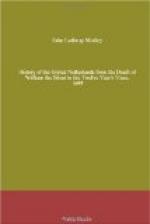The doctrine of predestination, the consciousness of being chosen soldiers of Christ, inspired those puritans, who founded the commonwealths of England, of Holland, and of America, with a contempt of toil, danger, and death which enabled them to accomplish things almost supernatural.
No uncouthness of phraseology, no unlovely austerity of deportment, could, except to vulgar minds, make that sublime enthusiasm ridiculous, which on either side the ocean ever confronted tyranny with dauntless front, and welcomed death on battle-field, scaffold, or rack with perfect composure.
The early puritan at least believed. The very intensity of his belief made him—all unconsciously to himself, and narrowed as was his view of his position—the great instrument by which the widest human liberty was to be gained for all mankind.
The elected favourite of the King of kings feared the power of no earthly king. Accepting in rapture the decrees of a supernatural tyranny, he rose on mighty wings above the reach of human wrath. Prostrating himself before a God of vengeance, of jealousy, and of injustice, be naturally imitated the attributes which he believed to be divine. It was inevitable, therefore, that Barneveld, and those who thought with him, when they should attempt to force the children of Belial into the company of the elect and to drive the faithful out of their own churches, should be detested as bitterly as papists had ever been.
Had Barneveld’s intellect been broad enough to imagine in a great republic the separation of Church and State, he would deserve a tenderer sympathy, but he would have been far in advance of his age. It is not cheerful to see so powerful an intellect and so patriotic a character daring to entrust the relations between man and his Maker to the decree of a trading corporation. But alas! the world was to wait for centuries until it should learn that the State can best defend religion by letting it alone, and that the political arm is apt to wither with palsy when it attempts to control the human conscience.
It is not entirely the commonwealth of the United Netherlands that is of importance in the epoch which I have endeavoured to illustrate. History can have neither value nor charm for those who are not impressed with a conviction of its continuity.
More than ever during the period which we call modern history has this idea of the continuousness of our race, and especially of the inhabitants of Europe and America, become almost oppressive to the imagination. There is a sense of immortality even upon earth when we see the succession of heritages in the domains of science, of intellectual and material wealth by which mankind, generation after generation, is enriching itself.
If this progress be a dream, if mankind be describing a limited circle instead of advancing towards the infinite; then no study can be more contemptible than the study of history.




